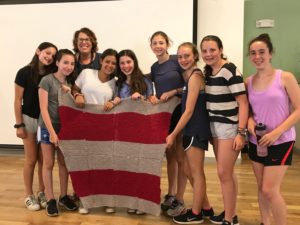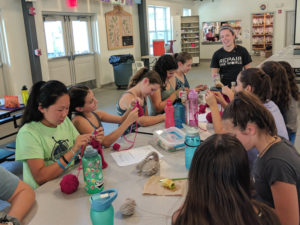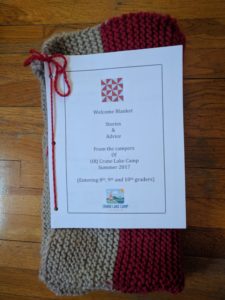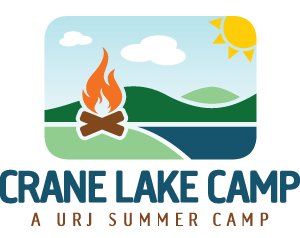by Lesley Litman, Faculty
“ Sometimes, in order to stand up you need to bend down.” These words were written by a camper for Erev Shabbat t’filah at Crane Lake Camp during the week when our Jewish Value of the Week was Lo Ta’amod – “Do not stand idly by.”
Sometimes, in order to stand up you need to bend down.” These words were written by a camper for Erev Shabbat t’filah at Crane Lake Camp during the week when our Jewish Value of the Week was Lo Ta’amod – “Do not stand idly by.”
During the week that preceded that Shabbat, almost 30 Crane Lake campers “bent down” (really sat down) to create a blanket to welcome new immigrants to the United States as part of the national Welcome Blanket Project. During Kesher that week, they learned how to knit, recounted and wrote down their family immigration stories, discussed and recorded their advice for new immigrants to this country, AND chatted and hung out while knitting.
The Crane Lake blanket will be displayed at the University of Chicago’s Smart Museum along with what Welcome Blanket Project founder Jayna Zweiman hopes will be 2,000 miles worth of yarn all knitted into blankets that will be given to immigrants. Zweiman’s idea was to replace 2,000 miles of cement wall on our southern border with 2,000 miles of yarn knit into warm, welcoming, cuddly blankets. Zweiman, now a resident of Los Angeles, is an alumna of the Solomon Schechter Day School in Newton, MA and was particularly excited to hear about the Crane Lake campers’ commitment to tikkun olam as manifest in their hard work to create this unique blanket. Before going to immigrants, the blankets (including ours) will be on exhibit at the Smart Museum of the University of Chicago (stop by if you are in the neighborhood).
 And it WAS hard work. Many campers had never before picked up knitting needles. Their tenacity and desire to learn this new skill despite lots of mistakes, ripping out lots of rows and sometimes needing to start over was a testament to their desire to make a difference, to not stand idly by. At the heart of learning to knit was the idea that life is a lot like knitting – we plan, we act and sometimes we succeed (and make it to the next row) and other times we need to “rip out” our plans and hopes and try again. When someone is in a time of “ripping out”, when life doesn’t quite go as planned or we face new challenges, it is gifts of warmth and support like the welcome blanket that can lift the spirits and nourish the soul.
And it WAS hard work. Many campers had never before picked up knitting needles. Their tenacity and desire to learn this new skill despite lots of mistakes, ripping out lots of rows and sometimes needing to start over was a testament to their desire to make a difference, to not stand idly by. At the heart of learning to knit was the idea that life is a lot like knitting – we plan, we act and sometimes we succeed (and make it to the next row) and other times we need to “rip out” our plans and hopes and try again. When someone is in a time of “ripping out”, when life doesn’t quite go as planned or we face new challenges, it is gifts of warmth and support like the welcome blanket that can lift the spirits and nourish the soul.
Perhaps most profound were the stories campers shared about their own families’ journeys to the United States. As I read them one evening I realized that not only were the stories beautifully and thoughtfully written, they also represent history as it lives into the present and the future in the form of our campers. The stories took my breath away:

My grandfather, along with his parents (my great-grandparents) lived in Germany during the Holocaust. In order to escape the Nazi party, my grandfather and his family boarded the St. Louis and, after being sent back from America, they landed in England. Years later, they came back to America to live with family in New York. —Sydney S.
My grandma was alive during Nazi Germany. She and her parents came to the U.S. It was a long and hard journey. —Bristol C.
My grandfather was born in Germany. As a young child he was bullied for being Jewish and his family had to move to different places in Europe. He and his brother were put in boarding school in London because it got so bad. His father got a visa to America and his family got on a boat and arrived in Ellis Island. —Grace D.
My dad came here with his brother to live with their uncle. They came from Iran because of the civil wars. My mom came from Germany and Iran for a better education. I’m first generation. —Mielle E.
Looking at the pictures of the campers knitting one might not guess the depth of their stories – they look like nice American kids at camp having a good time. Yet that time was filled with sharing and exploration of these remarkable family stories. And as the stories came out so did their advice for the immigrants:
Embrace new opportunities
Please stay safe, know your rights
Welcome. No matter what anyone says, you are valid.
Find people who love you for who you are.
And the list goes on.
As a Jewish educator, I think deeply about how we learn, what really sticks and what brings Jewish living and learning to life. The campers taught me to always look beneath the surface, to listen carefully to our kids and to be fully present as they learn, ask, share and explore. Thank you Crane Lake Camp, thank you Lower and Upper Chaverim and Olim campers for the blessings you make possible in our world.
Dr. Lesley Litman, in addition to being an utterly enraptured member of the CLC faculty in her first summer, is the Director of the Executive MA program in Jewish Education at HUC-JIR.
